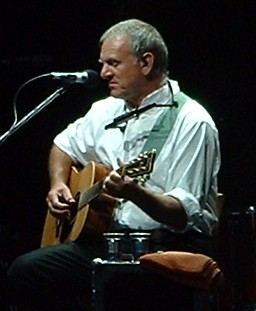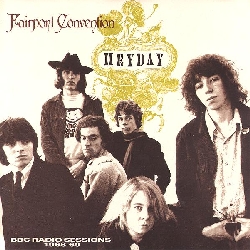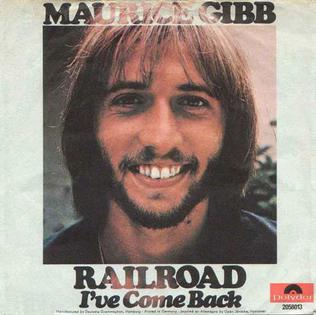Related Research Articles

Ralph McTell is an English singer-songwriter and guitar player who has been an influential figure on the UK folk music scene since the 1960s. McTell is best known for his song "Streets of London" (1969), which has been covered by over two hundred artists around the world.

Sir William Connolly is a Scottish retired comedian, actor, musician and television presenter, and currently an artist. He is sometimes known by the Scots nickname the Big Yin. Known for his idiosyncratic and often improvised observational comedy, frequently including strong language, Connolly has topped many UK polls as the greatest stand-up comedian of all time. In 2022 he received the BAFTA Fellowship for lifetime achievement from the British Academy of Film and Television Arts.
Transatlantic Records was a British independent record label. The company was established in 1961, primarily as an importer of American folk, blues and jazz records by many of the artists who influenced the burgeoning British folk and blues boom. Within a few years, the company had started recording British and Irish artists. The company's philosophy was intentionally eclectic.

Pentangle are a British folk rock band, formed in London in 1967. The original band was active in the late 1960s and early 1970s, and a later version has been active since the early 1980s. The original line-up, which was unchanged throughout the band's first incarnation (1967–1973), was Jacqui McShee (vocals); John Renbourn ; Bert Jansch ; Danny Thompson ; and Terry Cox (drums).

"Mr. Tambourine Man" is a song written by Bob Dylan, released as the first track of the acoustic side of his March 1965 album Bringing It All Back Home. The song's popularity led to Dylan recording it live many times, and it has been included in multiple compilation albums. It has been translated into other languages and has been used or referenced in television shows, films, and books.

Gerald Rafferty was a Scottish singer, songwriter, musician, and record producer. He was a founding member of Stealers Wheel, whose biggest hit was "Stuck in the Middle with You" in 1973. His solo hits in the late 1970s included "Baker Street", "Right Down the Line", and "Night Owl".

"Wait" is a song by the English rock band the Beatles from their 1965 album Rubber Soul. The song is credited to the Lennon–McCartney partnership. In the 1997 book Many Years from Now, Paul McCartney recalls it as entirely his work. In a 1970 interview with Ray Connolly, John Lennon could not remember writing it, saying, "That must be one of Paul's."

"Don't Let Me Down" is a song by the English rock band the Beatles, recorded in 1969 during the Let It Be sessions. It was written by John Lennon and credited to the Lennon–McCartney songwriting partnership. The band recorded the song with keyboardist Billy Preston; the single release with "Get Back" was credited to "the Beatles with Billy Preston". Originally released as a B-side, producer Phil Spector excluded the song from Let It Be. The song's first appearance on an album was on the 1970 collection Hey Jude.
Bill Leader is an English recording engineer and record producer. He is particularly associated with the British folk music revival of the 1960s and 1970s, producing records by Paddy Tunney, Davey Graham, Bert Jansch, John Renbourn, Frank Harte and many others.

Bleecker & MacDougal is the debut solo studio album by the American folk musician Fred Neil. It was released in May 1965 by Elektra Records. The recording, which unlike many folk albums at the time featured electric guitar backing, had an influence on the folk rock movement.

Snakes and Ladders is the fourth album by Gerry Rafferty. It was released in 1980, following the success of his previous two albums, City to City and Night Owl. The album charted at No. 15 in the UK but only reached No. 61 in the US, while singles achieved #54UK, and #67UK / #54US. The album was released on CD in 1998 [EMI 7 46609-2] but deleted soon after that, and it got reissued on CD in August 2012 as a 2-CD set with "Sleepwalking."

Can I Have My Money Back? is the first solo album by Gerry Rafferty. The distinctive cover design was by John Patrick Byrne and was the start of a long working relationship between Rafferty and the playwright. The LP was well received, but performed poorly in charts and sales, in part because Rafferty had just left a well known band, The Humblebums. The album also saw Joe Egan come on board, and the pair formed Stealers Wheel shortly afterwards.

Iron Mountain Depot is John Hartford's sixth and final album issued by RCA Victor, released in 1970.

Heyday: the BBC Radio Sessions 1968–69 is an album by the English folk rock band Fairport Convention first released in 1987. As its title suggests, it consists of live versions of songs recorded for John Peel's Top Gear radio programmes.

Transatlantic Years is a double compilation album by Billy Connolly, released in 2001 on Sanctuary Records. It includes material recorded between 1969 and 1974, both with Connolly as a solo act and also as a member of the Humblebums, either with Gerry Rafferty or Tam Harvey.

Gerry Rafferty, released in 1974 by Transatlantic Records, and reissued 1978 in the US by Visa Records, is a compilation of mainly Humblebums material that Gerry Rafferty had written and performed while in that group. It comprises most of the serious musical content of the last two albums released by that group, with the exception of "So Bad Thinking", which was the B-side of his "Can I Have My Money Back?" single. The remaining content of those two albums were mostly humorous Billy Connolly compositions. All song versions on this album are available in CD form on various Humblebums compilations.

In the Beginning is a compilation album by the American folk rock band the Byrds and was released in August 1988 by Rhino Records. It features demo recordings made during 1964, before the band became famous.

"Bluebird" is a song recorded by the American rock group Buffalo Springfield. It was written and produced by Stephen Stills, with co-production by Ahmet Ertegun. In June 1967, Atco Records released it as a single to follow-up their hit "For What It's Worth" (1966).

"Railroad" is the first solo single released by Maurice Gibb, best known as a member of the Bee Gees. It was released in April 1970. Like the Bee Gees' songs from 1967 to 1972, the single was released by Polydor in most parts of the world while in the US and Canada it was released by Atco. In Canada it was also released by Atlantic and Cotillion. Gibb did not release a follow-up single until 1984 when he released "Hold Her in Your Hand".

The Genesis of Slade is a compilation album of pre-Slade era recordings by British rock band Slade. It was first released in 1996 by The Music Corporation and was later re-issued by Cherry Red in 2000.
References
- 1 2 3 4 5 6 7 Colin Larkin, ed. (1997). The Virgin Encyclopedia of Popular Music (Concise ed.). Virgin Books. pp. 632/3. ISBN 1-85227-745-9.
- ↑ "Shoeshine Boy" charting in the Veronica Top 40 in 1970.
- ↑ Gray, Michael (4 January 2011). "Gerry Rafferty obituary". The Guardian. Retrieved 19 December 2021.
- ↑ Pease, Victoria (19 December 2021). "Billy Connolly's former bandmate Tam Harvey from The Humblebums dies". STV. Retrieved 19 December 2021.
- ↑ Unterberger, Richie (2014). Jingle Jangle Morning: Folk-Rock in the 1960s. BookBaby. ISBN 978-0991589210 . Retrieved 25 April 2018.
- ↑ "Recordings". High Fidelity . Vol. 21, no. 7–12. 1971. p. 121.